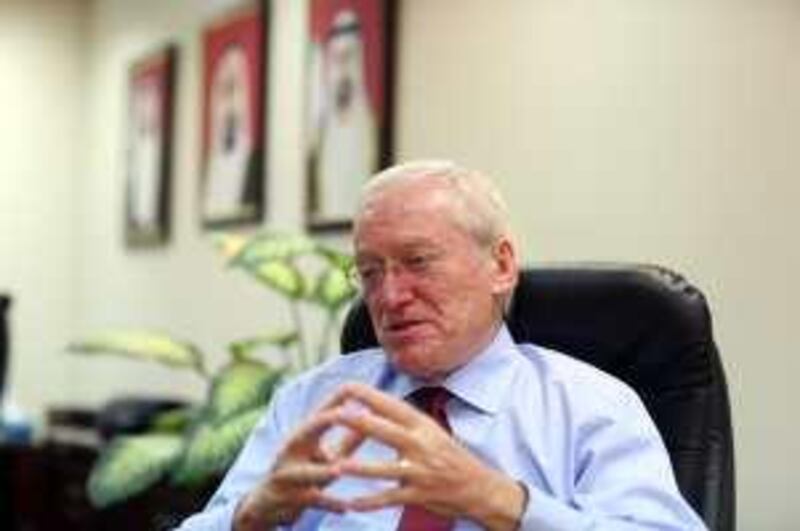ABU DHABI // The capital's ambition of becoming a global hub for renewable energy technology moves a step closer to fruition tomorrow when students arrive for the first classes at the Masdar Institute of Science and Technology.
Part of the ground-breaking, carbon-neutral Masdar City, the centre will study everything from new ways of converting the sun's rays into energy to developing lightweight alloys. In doing so, officials hope, it will spark the creation of a new range of industries in Abu Dhabi and diversify the economy away from oil and gas into more sustainable technologies. Dr John Perkins, the institute's provost, said the government-funded centre also aimed to make people think differently about energy in the UAE, which has one of the highest per capita carbon footprints of any country.
"We're engaged in a long-term project to change perceptions and attitudes," he said. "The Masdar Institute is aiming to be a world-class postgraduate institute focused on renewable energy. It will take us a while to get to that position and to have that influence on the local community, but it's very important for the future of this country and the future of the world that we're successful." While the students will initially work in temporary facilities near the Petroleum Institute in Abu Dhabi, they will have their own purpose-built campus in Masdar City by the start of the next academic year.
Parts of the building, designed by a leading British architect, Lord Foster, could be ready for occupation by the end of this year. "It will be an iconic and pretty unique educational facility," said Dr Perkins. It would be a zero-carbon-emissions building, thanks in part to being solar-powered. Masdar City has been designed to be the world's first zero-emissions city, with public transport powered by renewable energy sources in place of cars and buildings. Due for completion in 2016, it is projected to house 50,000 people and contain 1,500 businesses, many focused on environmentally friendly technology.
Tomorrow, 92 students at the institute will begin two-year master's degree courses in engineering and systems management, IT, materials, water and the environment and mechanical engineering. Students will spend about half their time researching and writing a thesis, with some then likely to continue in the capital when the institute launches PhD courses. There were about 1,200 applicants for the master's degrees, allowing the institute to be even more selective than the renowned Massachusetts Institute of Technology, which is providing academic support, said Dr Perkins.
All students have their tuition fees and living costs paid, and additionally the institute is currently sponsoring Emiratis to take PhDs overseas with a view to their returning to Abu Dhabi as staff members. "The most exciting opportunity [for students] is to engage with the Masdar initiative more broadly," Dr Perkins said. "We're determined the institute will be research-led, which is quite unusual. A number of institutions [in the UAE] have expressed an aspiration to move in this direction, but we'll be that right from the start."
One key research area will be helping to make solar power as cost-efficient as less environmentally friendly sources of energy such as fossil fuels. "We're really concerned to deliver high-quality research to help Abu Dhabi position itself in the knowledge economy," said Dr Marwan Khraisheh, the dean of engineering. The institute hopes to increase its student body to between 600 and 1,000 over the next five years.
Some of those beginning lectures tomorrow have already spent a year at the institute on "pre-class" projects. Among them is Karim Mousa, 23, a Jordanian with a bachelor's degree from the University of Liverpool in England. He is about to begin a master's degree in engineering systems and management. "It's been very interesting," he said of the year at the institute. "We have discovered a lot of things since we got here. My experience with a group of professors has been very helpful and I feel like I am ready to go into the research now."
There are 28 women among the 92 students, including Nadia al Mannai, 23, an Emirati who is now beginning an IT master's degree. She too was among the pre-class group. "It's a privilege for us, it's the first initiative for renewable energy in this area," she said. "We're proud the International Renewable Energy Agency is part of Masdar and that will help us a lot in our future projects. "This is a start to influence others to stop producing this pollution. It is a first step and it will encourage a lot of other people to do similar projects."
dbardsley@thenational.ae






